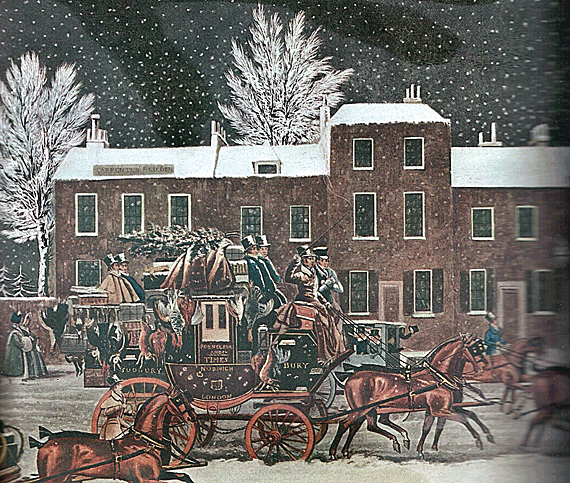
“Christmas, my child, is love in action.”
—Dale Evans Rogers
Normally, during the Christmas season in England during the 19th Century, parcels were more lucrative than paying passengers. It was during the reign of William IV, between 1830 and 1837, that coach and inn were meant to take care of passengers along the Mile End Road in thick snow. The Times Coach (on this page) is hung round with grouse, pheasants, ducks, turkey, and hares, and on the roof were three Christmas trees.
All over England travelers depended on light coaches to carry them from a main coaching terminal to their destinations. Every town had a posting inn where a chaise and a pair of horses could be hired. They were built to carry only two passengers. The cost was a shilling a mile.
From Arthur Young’s “A Six-Month Tour Through England,” published in 1770, we read that the minutiae of a journey matters to a man’s notice. Good roads and convenient accommodations for travelers are necessary, not only to agriculture and manufactures, but to the fine arts and every embellishment of life. The coach implies a state of prosperity and elegance. A traveler will find a decent bed, clean sheets, plenty of fewel (fuel), and wholesome provisions.

Then he proceeds to rate some of the inns which is a riot to read. Old King’s Arms was dirty and disagreeable. Veal cutlets, tarts, and cheese were available for supper. At Castle Howard it was “an excellent house, but dear, what a saucy landlady.” At the Dunstable Inn there were served “Mutton steakes, duck, bread at two shillings a head. At Stamford there was a meal “exceeding good and reasonable, but wretched waiting.”
Dr. Samuel Johnson wrote that “There is nothing which has yet been contrived by man, by which so much happiness is produced, as by a good tavern or inn.” Johnson cites an excellent inn at Chapel House where he “expatiated on the felicity of England in its taverns and inns.” It was noted that at the “Swan with Two necks on Lad Lane, at the General Coach Office, that the size of William Chaplin’s coaching business operated from five yards, running 1,300 horses, and 60 coaches on the road.”
The Christmas season in London, circa 1800s was a festive occasion filled with the best of foods and drink. The confusion and noise attending the departure of a mail coach meant that some packages would arrive on time, while others would not. Most everyone, “from the lowest life in London in the East End,” would plan for a gay and jolly holiday season.
Diversions included sailing on the River Thames, card games, gambling, horse races, whist, ball games, masquerades, cotillions, afternoon tea, or sewing circles. Each home was decorated in the best possible manner with evergreens and mistletoe. With shiny baubles and delicate laces. With bowls of fruit and cookies of every description. Fruitcakes, soaked in spirits, were especially welcome.
The Pilentum Landau Coach would deposit guests for a fortnight stay with relatives all rejoicing in the season and the fact that they were all together for the festivities. The children were beside themselves with glee anticipating the coming of St. Nicholas and stockings on the hearth filled with filberts and oranges and many tasty candies. As all would approach Christmas, it was with a heart of joy and mirth.

